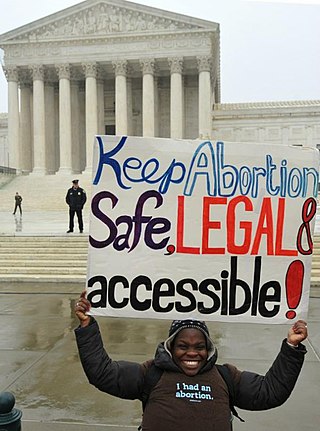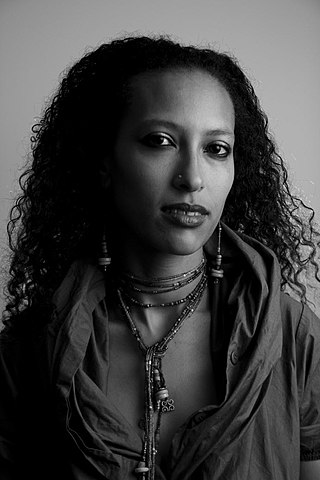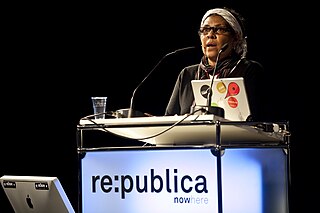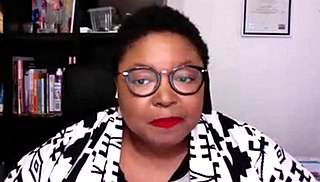Related Research Articles

A woman is an adult female human. Before adulthood, a woman is referred to as a girl.

Women's rights are the rights and entitlements claimed for women and girls worldwide. They formed the basis for the women's rights movement in the 19th century and the feminist movements during the 20th and 21st centuries. In some countries, these rights are institutionalized or supported by law, local custom, and behavior, whereas in others, they are ignored and suppressed. They differ from broader notions of human rights through claims of an inherent historical and traditional bias against the exercise of rights by women and girls, in favor of men and boys.
Women's health differs from that of men's health in many unique ways. Women's health is an example of population health, where health is defined by the World Health Organization (WHO) as "a state of complete physical, mental and social well-being and not merely the absence of disease or infirmity". Often treated as simply women's reproductive health, many groups argue for a broader definition pertaining to the overall health of women, better expressed as "The health of women". These differences are further exacerbated in developing countries where women, whose health includes both their risks and experiences, are further disadvantaged.
Reproductive rights are legal rights and freedoms relating to reproduction and reproductive health that vary amongst countries around the world. The World Health Organization defines reproductive rights as follows:
Reproductive rights rest on the recognition of the basic right of all couples and individuals to decide freely and responsibly the number, spacing and timing of their children and to have the information and means to do so, and the right to attain the highest standard of sexual and reproductive health. They also include the right of all to make decisions concerning reproduction free of discrimination, coercion and violence.

Sexual and reproductive health (SRH) is a field of research, health care, and social activism that explores the health of an individual's reproductive system and sexual well-being during all stages of their life. Sexual and reproductive health is more commonly defined as sexual and reproductive health and rights, to encompass individual agency to make choices about their sexual and reproductive lives.
Byllye Yvonne Avery is an American health care activist. A proponent of reproductive justice, Avery has worked to develop healthcare services and education that address black women's mental and physical health stressors. She is best known as the founder of the National Black Women's Health Project, the first national organization to specialize in Black women's reproductive health issues. For her work with the NBWHP, she has received the MacArthur Foundation's Fellowship for Social Contribution and the Gustav O. Lienhard Award for the Advancement of Health Care from the Institute of Medicine of the National Academy of Sciences, among other awards.

Violence against women (VAW), also known as gender-based violence and sexual and gender-based violence (SGBV), is violent acts primarily or exclusively committed by men or boys against women or girls. Such violence is often considered a form of hate crime, committed against women or girls specifically because they are female, and can take many forms.
Lieve Fransen is a senior adviser to the European Policy Centre on health, social and migration policies, and published studies on investing in social infrastructure, energy poverty and social investment. Between 2011 and 2015 she was the social policies director in the Directorate for Employment and Social affairs for the European Commissionin charge of social policies, poverty eradication, pensions, health and social protection. Before that she was director for communication and representations in the EC's communication directorate for more than 500 networks across the European Union and from 1987 till 1997 she was head of unit for human development in the European Commissions department for development.

Reproductive justice is a critical feminist framework that was invented as a response to United States reproductive politics. The three core values of reproductive justice are the right to have a child, the right to not have a child, and the right to parent a child or children in safe and healthy environments. The framework moves women's reproductive rights past a legal and political debate to incorporate the economic, social, and health factors that impact women's reproductive choices and decision-making ability.
Research Action and Information Network for the Bodily Integrity of Women is an international non-governmental organisation working to eliminate female circumcision and female genital mutilation.
Nahid Toubia is a Sudanese surgeon and women's health rights activist, specializing in research into female genital mutilation.

Abortion-rights movements are movements that advocate for legal access to induced abortion services, including elective abortion. They seek to represent and support women who wish to terminate their pregnancy without fear of legal or social backlash. These movements are in direct opposition to anti-abortion movements.

Domestic violence in South Africa has been viewed as a taboo subject until recently. In 2012, just over one-third of violent crimes committed against women ended in criminal prosecution. Legislation has been passed to help improve the quality of life for victims of abuse and to prevent further abuse from taking place. Although the movement against domestic violence is a relatively new movement, it has been making great strides in the country since the 1990s.

Jessica Horn is a feminist activist, writer, poet, and an advisor on women's rights with Ugandan and Malian background. Her work focuses on women's rights, bodily autonomy and freedom from violence, and African feminist movement building. She was named as an African woman changemaker by ARISE Magazine and as one of Applause Africa's "40 African Changemakers under 40". She joined the African Women's Development Fund as director of programmes in October 2015.

Natalia Kanem is a medical doctor who currently serves as the Executive Director of UNFPA, the United Nations sexual and reproductive health agency. In this capacity, she is among the highest-ranking women at the United Nations and the first Latin American to head UNFPA.

Sokari Ekine is a Nigerian activist, blogger and author. She worked as a journalist at the Pambazuka News and has also written for Feminist Africa and New Internationalist. Ekine kept a blog between 2004 and 2014 in which she covered a number of topics including LGBTI rights, women's rights, and environmental issues. She has co-written or edited four books, and taught English to school children in Haiti.

Loretta J. Ross is an American academic, feminist, and activist who advocates for reproductive justice, especially among women of color. As an activist, Ross has written on reproductive justice activism and the history of African American women.
Anita Raj is an American developmental psychologist and global public health researcher focused on sexual and reproductive health, maternal and child health, and gender inequalities including gender-based violence, discrimination and bias. Until 2023, Raj was the Tata Chancellor Professor of Society and Health and was a professor in the Departments of Medicine and Education Studies at the University of California, San Diego. Raj was also the Founding Director of UCSD's Center on Gender Equity and Health. In 2023, Raj was named the Executive Director of the Newcomb Institute at Tulane University.

The respect for animal rights in Jainism, Hinduism, and Buddhism derives from the doctrine of ahimsa.

Tlaleng Mofokeng is a South African physician who is the United Nations' Special Rapporteur on the Right to Health. She campaigns for universal health access and HIV care. She was named one of the BBC's 100 Women in 2021.
References
- ↑ ""Edutainment" in South Africa: a force for change in health. An interview with Shereen Usdin". Who.int. World Health Organisation. Archived from the original on 22 October 2014. Retrieved 2 January 2019.
- ↑ Usdin, Shereen; Christofides, Nicola; Malepe, Lebo; Maker, Aadielah (2000). "The value of advocacy in promoting social change: Implementing the new domestic violence act in South Africa". Reproductive Health Matters. 8 (16): 55–65. doi:10.1016/S0968-8080(00)90187-3. PMID 11424250. S2CID 35994556.
- ↑ Shereen Usdin (September 2007). The No-Nonsense Guide to World Health. New Internationalist. ISBN 978-1-906523-68-8.